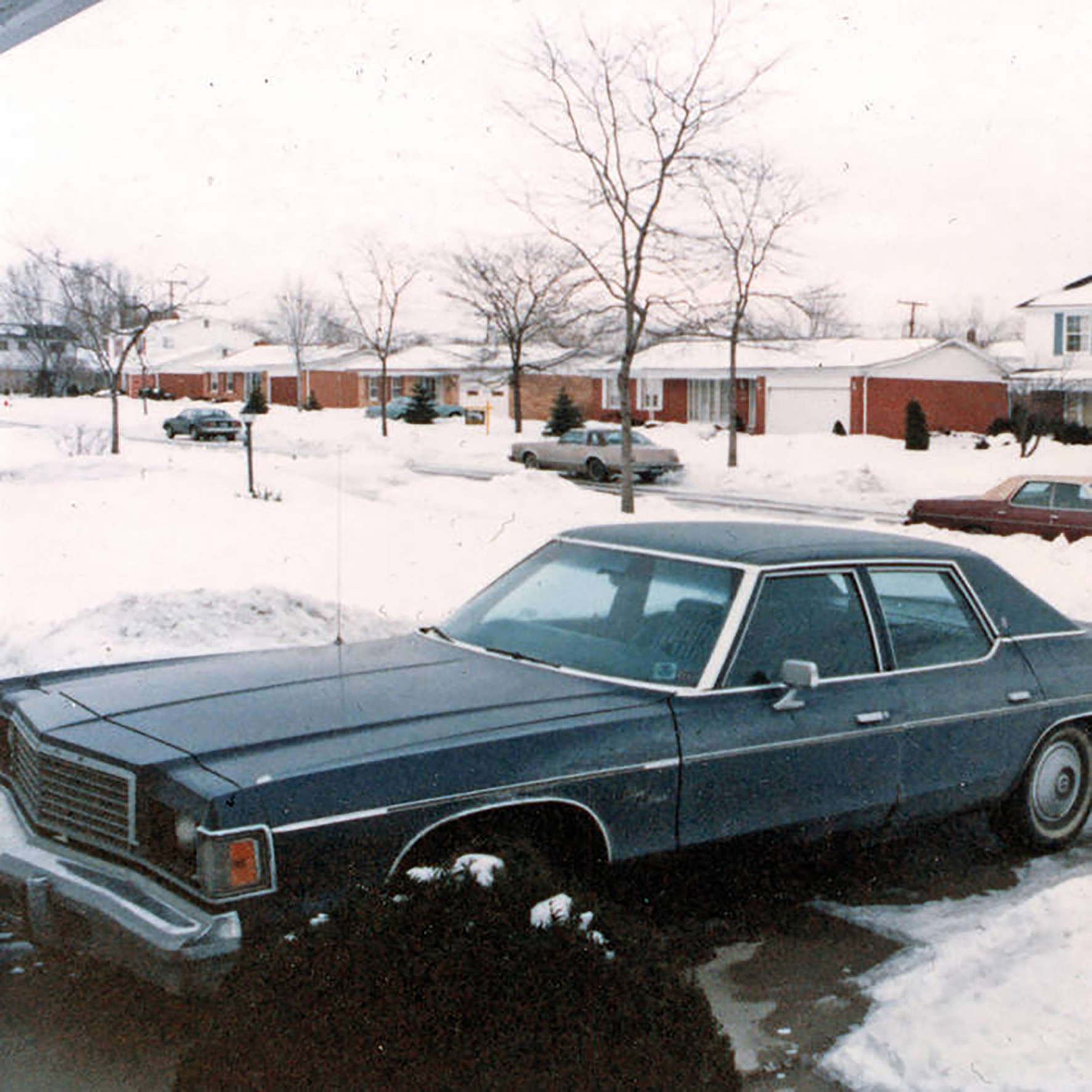His Name is Alive, "Return to Never (Home Recordings 1979 - 1986 Vol 2)"
 The first foray into Warren Defever's teenage tape archive (last year's All The Mirrors in the House) was an absolute revelation that actively courted disbelief, but this second installment is a bit more modest in its scope. As a result, Return To Never unavoidably feels a bit underwhelming and insubstantial by comparison, but it is still a likable album that scratches roughly the same itch, as I am very much a fan of Defever's homespun, early lo-fi experiments. While there are still a healthy number of melodic guitar pieces strewn throughout the album, Return to Never is generally a more experimental and abstract affair than the previous volume. Phrases like "analogue murk" and "greyscale industrial drone" are tossed around in the album's description and they are fairly apt: if All The Mirrors captured a teenage Defever accidentally inventing shoegaze, Return to Never captures him accidentally mirroring the sounds of the early '80s noise underground (or at least calls to mind someone playing shoegaze-style guitar over such a tape). The warmer, more "ambient" passages still tend to be the best ones, but if some moments from Return to Never had found their way onto an early Broken Flag tape, I doubt anyone would have blinked or raised an eyebrow.
The first foray into Warren Defever's teenage tape archive (last year's All The Mirrors in the House) was an absolute revelation that actively courted disbelief, but this second installment is a bit more modest in its scope. As a result, Return To Never unavoidably feels a bit underwhelming and insubstantial by comparison, but it is still a likable album that scratches roughly the same itch, as I am very much a fan of Defever's homespun, early lo-fi experiments. While there are still a healthy number of melodic guitar pieces strewn throughout the album, Return to Never is generally a more experimental and abstract affair than the previous volume. Phrases like "analogue murk" and "greyscale industrial drone" are tossed around in the album's description and they are fairly apt: if All The Mirrors captured a teenage Defever accidentally inventing shoegaze, Return to Never captures him accidentally mirroring the sounds of the early '80s noise underground (or at least calls to mind someone playing shoegaze-style guitar over such a tape). The warmer, more "ambient" passages still tend to be the best ones, but if some moments from Return to Never had found their way onto an early Broken Flag tape, I doubt anyone would have blinked or raised an eyebrow.
In Dominic Foster's haunting and beautiful short promotional video for Return to Never, the album is described as the work of a "compulsive 13-year-old with no social life" that has now been "blended together with an adult hand."Such a description could certainly apply to All the Mirrors in the House as well, but it definitely feels quite a bit more believable this time around, as most of these pieces plausibly sound like the cooler excerpts culled from hours and hours of precocious experimentation with effects and field recording.Consequently, I do not at all envy Shelley Salant for being the one who had to listen to all of the indulgent juvenilia that must have surrounded the gems that ultimately wound up on this album.I am quite curious about what the original context was for some of the briefer pieces though.For example, the gorgeously quivering shimmer of "Chords" only lasts about thirty seconds, which makes me wonder what happened to the rest of the piece and how badly it must have derailed to leave behind such a brief snatch of beauty once the editing was complete.I feel similarly about the album's most improbable piece, "From The Night Tape," which feels both fully formed and years ahead of its time: a blown-out bass thrum and out-of-phase, backwards high hats propel a swirling miasma of shoegaze guitars for roughly thirty seconds and then it all vanishes abruptly.Obviously, the perplexing brevity of some of the album's strongest pieces creates some enticing mysteries, yet "Night Tape" goes one step further in making me wonder why such an immediately gratifying and cool aesthetic was not explored further or revisited: there are fourteen other songs on the album, yet none of them flirt with beats or grooves again.My guess is that "Night Tape" was either a newly assembled collage of multiple pieces or that it immediately predated the blossoming of His Name is Alive into a more song-based project.
For the most part, however, Return to Never is devoted to a series of atmospheric vignettes that bounce between dreamlike guitar soundscapes and hiss-soaked field recordings of crashing waves and heavy machinery.Both sides have their merits, of course, but the album's more melodic pieces are definitely the ones that play more to Defever's strengths.The best of the lot is the swooning "To Remember," which takes a woozily lovely, seesawing loop and ravages it with sputtering snarls of static.The shimmering and chiming drift of "Guitar Echo" is quite nice as well (albeit a bit unformed/improvisatory by comparison).There are also a handful of pieces that combine gently swaying soft-focus guitar drones with primitive sound collage, though the inherent hiss and murk of recording on a boombox tends to overpower the nuances of the latter.Still, some are quite good, such as the lovely and meditative title piece, which is slowly eclipsed by crashing waves that segue into the similarly fine "Lake Night."
"My Thoughts to Thee are Drawn" is another sublime treat, as languorous, hazy strings drift over something that sounds like a field recording of a passing train heard from underwater.The album also features a pair of unexpected and abrasive surprises at the end in the form of "White Snake" and "Gone."Neither is particularly substantial, sadly, yet both share an endearing "anything goes" sense of gleeful derangement.In the former, a rock frontman asks a cheering crowd how many of them are going to see Whitesnake that weekend before the piece plunges into a simmering maelstrom of buzzing, pulsing, and crackling noise.That cacophony then segues into a half-gnarled/half-anthemic piece that calls to mind a Jesus and Mary Chain gig in which all of the band’s amplifiers explode as soon as they launch into their first song, leaving only a muscular bass line in a squall of harsh feedback and howling noise.
My only real grievance with Return to Never is that "To Remember" is the only piece that feels like a strong, stand-alone "single."Obviously, that is somewhat unavoidable given the nature of this collection, but All the Mirrors in the House managed to pull off the illusion of being a substantial, deliberate, and thematically focused whole anyway.I imagine that is an incredibly hard trick to repeat though and Defever admittedly does a fine job editing these disparate sketches together into something that flows quite well.In fact, it could be argued that he actually did quite an amazing job of curating and editing these pieces, as this album has distinct "winter" feel that is very different from its more autumnal and sun-dappled predecessor.Maybe this album is every bit as good as Mirrors and I just do not like winter as much as I like fall.Or maybe I am projecting all of this.Anything is possible.Only Defever knows what his intentions were, of course, but Return to Never does feel like its own statement rather than a lesser version of Mirrors.Mike McGonigal is not far from the mark when he claims in the liner notes that all of these pieces would probably be considered "lost classics of modern minimalism" if they could be stretched and expanded to fill a whole side of vinyl.I only take issue with the "all" part of that statement, as I probably would have loved this album if two or three of its best pieces had been stretched out for 10 of 15 minutes each.Alas.Given all of my unanswered questions and unmet aspirations for this album, I am very curious to see what the next (and final) installment of this series will be like, as it will clarify once and for all whether or not Mirrors got the lion's share of teenage Defever's best moments or if he still has a mountain of great unreleased material that he is merely categorizing by mood.In any case, I enjoy Return to Never, but it is not quite on the same level as previous bombshell compilations like King of Sweet or Mirrors, as Defever has set a very high bar for how truly wonderful his vault scraping can be.
Samples can be found here.



